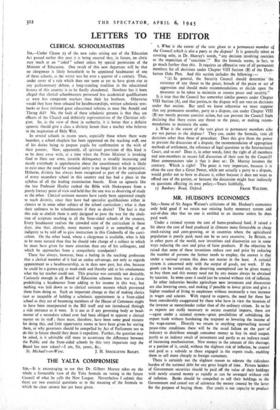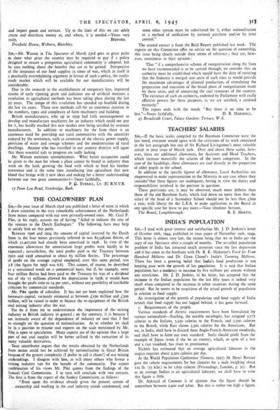MR. HUDSON'S ECONOMICS SIR,—Some of Sir Angus Watson's criticisms of
Mr. Hudson's economics only hold good if we retain our existing faulty monetary system and out-of-date idea that no one is entitled to an income unless he does paid work.
Under a rational system the cost of home-produced food, if raised a bit above the cost of food produced in climates more favourable to cheap stock-raising and corn-growing, or in countries where the agricultural population is poorly paid, need not be so very excessive. In Britain, as in other parts of the world, new inventions and discoverieS are in some ways reducing the cost and price of farm products. If the objection be raised that some of these inventions reduce cost and price by reducing the number of persons the farmer needs to employ, the answer is that under a rational system this does not matter in the least. A rational system is concerned only with the output of goods, not work. If the goods can be turned out, the deserving unemployed can be given money to buy them and this money need not by any means always be obtained by taxation. In some cases it could just be created without risk of inflation.
In other industries besides agriculture new inventions and discoveries are also lowering costs, and making it possible to lower prices and give a higher standard of living to employees without necessarily a vast increase in wages and salaries. With regard to exports, the need for these has been considerably exaggerated by those who have in view the interests of the investor or moneylender rather than of the ordinary citizen. In so far as exports are really necessary to secure essential imports, there are —again under a rational system—great possibilities of subsidising the export trade without burdening the taxpayer or lowering the income of the wage-earner. Directly we return to anything approaching normal peace-time conditions there will be the usual failure on the part' of industry to distribute enough consumer money to buy its total output. partly as an indirect result of investment and partly as an indirect result of increasing mechanisation. New money to the amount of this shortage, or a portion of it, could, without the slightest risk of inflation, be created and paid as a subsidy to those engaged in the export trade, enabling them to sell more cheaply to foreign customers.
There is certainly not the slightest reason to tolerate the ridiculous burden of the national debt for any great length of time. Private holders of Government securities should be paid off the value of their holdings with newly created money as rapidly as can be arranged without risk of inflation. Banks should be compelled to sell their holdings to the Government and cancel out of existence the money created by the latter for the purpose of buying them. Our credit is our capacity to produce and import goods and services. Up to the limit of this we can safely create and distribute money as, and where, it is needed.—Yours very truly, BEDFORD. Froxfield House, Woburn, Bletchley.



























 Previous page
Previous page